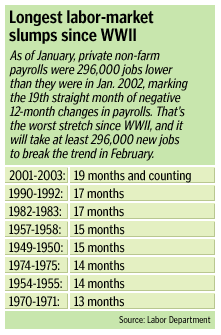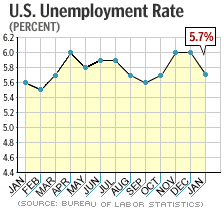NEW YORK (CNN/Money) -
If you were cryogenically frozen in March 2001 and had asked to be thawed out in two years, with the idea that certainly the job market would be better by March 2003 -- well, you'd better get back in the deep freeze for a while.
The labor market is, in fact, in its longest slump since World War II, and it probably didn't get much better in February. It's probably not going to improve in March, either.
| Joblessness on the rise
|

|
|
|
|
On Friday, the Labor Department is scheduled to report February's unemployment rate and change in non-farm payrolls. According to a Reuters poll, economists, on average, expect unemployment to rise to 5.9 percent from 5.7 percent and for non-farm payrolls to grow by 8,000 jobs after adding 143,000 jobs in January.
That poll was taken before Thursday's report that weekly jobless claims jumped in the last week of February to the highest level of the year, reinforcing economists' fears that February's report could be even worse than expected.

"There were a lot of negative developments in the month. A lot of Americans went overseas [in the build-up to a possible war in Iraq], causing companies to take those people off their payrolls, and weather was also a consideration," Anthony Chan, chief economist at Banc One Investment Advisors, told CNNfn's Market Call. "Be on the lookout for a weak labor market.”
While 5.9 percent unemployment would not be nearly as bad as the 7.8 percent peak in the 1990-92 recession/recovery period, it might not paint a complete picture of just how bad the labor market is.
Consumers wary
Consumers -- whose spending makes up more than two-thirds of the total economy -- seem to know better. According to the latest consumer confidence survey by the Conference Board, a private research group, the percentage of consumers saying jobs are "hard to get" rose in February to a nine-year high.

Recent data reinforce that belief. Private-sector unemployment is at 7 percent -- far worse than 2002’s average rate of 6.2 percent -- and the 12-month net change in private payrolls has been negative ever since July 2001 and will likely stay negative in February, adding to the longest such stretch of pain since 1944-46.
The number of people who are either unemployed, or have given up looking for work, or who are working part-time because there's nothing better available rose to 11 percent of the labor force in January, the highest level since January 1995.
Business hiring intentions for the second quarter, as measured by staffing firm Manpower Inc.'s latest quarterly Employment Outlook Survey, fell for the first time in a year.
And corporate layoff announcements jumped 5 percent in February, according to the latest tally from outplacement firm Challenger, Gray & Christmas, whose CEO, John Challenger, said labor-market weakness could linger until the fall, if not longer.
“People have been saying ‘the recovery is six months away’ for two years running,” Challenger said. “But it doesn’t seem like there are any signs that suggest an imminent turnaround -- even a fall recovery is questionable.”
Pay stubbed
All this labor market weakness puts a tight lid on wage and salary growth -- after all, you've got a lot less leverage when looking for a raise if your boss knows there are plenty of cheap replacements out there just waiting to get hired.
| Related stories
|

|
|
|
|
Morgan Stanley economist Bill Sullivan recently noted that wage growth had slowed to an annual rate of just 2.7 percent in the three months between October 2002 and January 2003, the latest data available -- barely beating the 2.6 percent annual growth rate of the consumer price index, a key measure of inflation.
"Flat to negative income growth always presents a challenge to the economy as consumers tend to become more cautious when their wages fail to keep up with the cost of living," Sullivan said in a note on the Morgan Stanley Web site.
The consensus among economists is that, once the U.S. clears up its problems in Iraq, businesses will start spending and hiring again, driven by super-low interest rates, a hoped-for rebound in stock prices and other factors.
"The fact that the dollar is weakening makes the export sector more competitive, and inventories are extremely lean, so companies will have to rebuild them at some point," said UBS Warburg senior economist Jim O'Sullivan. "There are pluses out there, and I think they'll start to win out. When the Iraqi uncertainty fades, we'll start to see companies invest more and hire more, and that'll feed on itself."
And by keeping labor costs so low for so long, businesses have made themselves much more productive -- last year, non-farm productivity posted the biggest gain since 1950 -- which means corporate profits could take off when demand picks up.
"Firms did an amazing job of running their companies efficiently during 2002. The bad news was that the productivity gains allowed them to limit their hiring," said Joel Naroff, president and chief economist at Naroff Economic Advisors. "Thus, it will take much faster growth to get the companies to start rapidly adding to payrolls."
Many economists think fast growth will follow rather quickly in the wake of an easy U.S. victory in Iraq.
A minority of economists, however, worry that there are still too many problems remaining from the popping of the late-1990s investment bubble to encourage much growth or much hiring any time soon.
“There’s no solid evidence the economy is primed to bounce back,” said Rory Robertson, interest rate strategist at Macquarie Equities (USA). “Firms are worried about Iraq, but ... the main problem is low profits, low share prices, weak demand, an anxious view of the future and excess capacity; so there’s no need to add workers, inventories, or new plants and equipment.”

|

